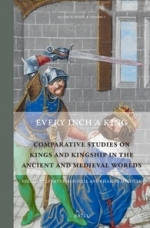Citation:
| 184 KB |

Abstract:
This article examines two panegyrics (praise poems) written for contemporaneous tenth-century rulers, Æthelstan (Athelstan, Aethelstan) of Anglo-Saxon England and ‘Abd al-Rahman III (‘Abd ar-Rahman, Abderraman), first amir then caliph of Umayyad Spain. The paper treats an anonymous praise poem for Æthelstan, "Carta dirige gressus," which portrays the Anglo-Saxon king as a Carolingian-style emperor of all Britain, and the historical urjuza of Ibn ‘Abd Rabbihi (Ibn ‘Abd Rabbih, Ibn ‘Abdrabbih), which recounts ‘Abd al-Rahman III’s military and political successes. The article argues that praise poetry is important in legitimating ideological novelties, but that clever panegyrists often created a space for themselves in the ideological webs they wove for their innovating rulers. Thus Ibn ‘Abd Rabbihi especially linked the glory of caliphal power to a caliph's generosity toward praise poets like himself.
